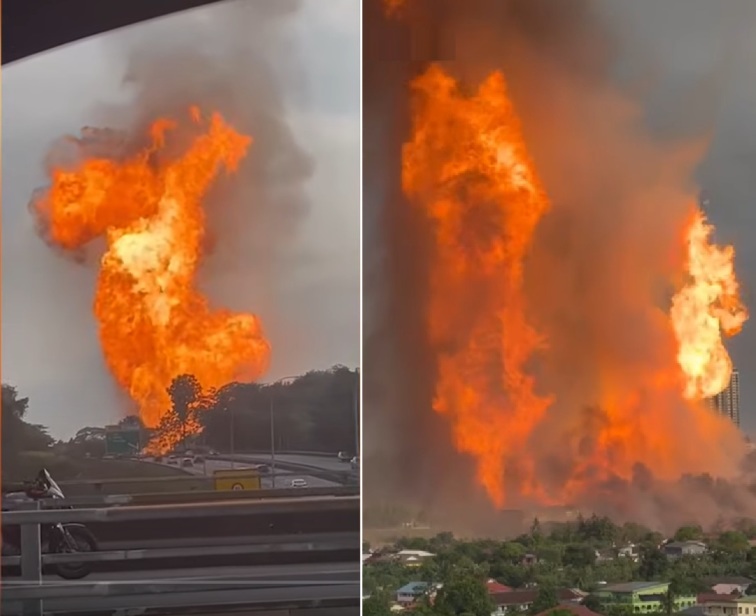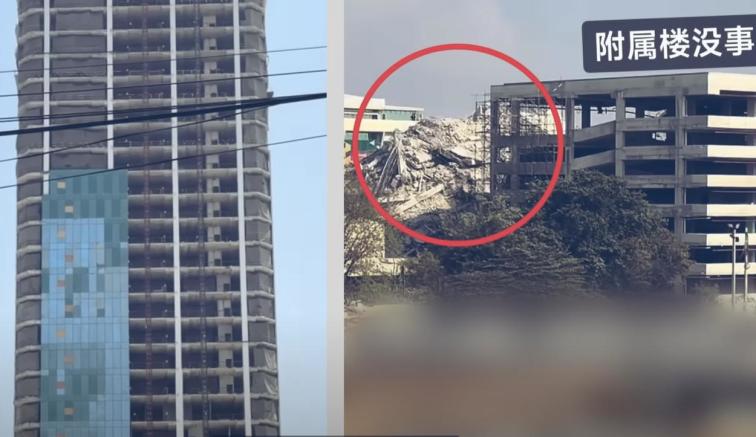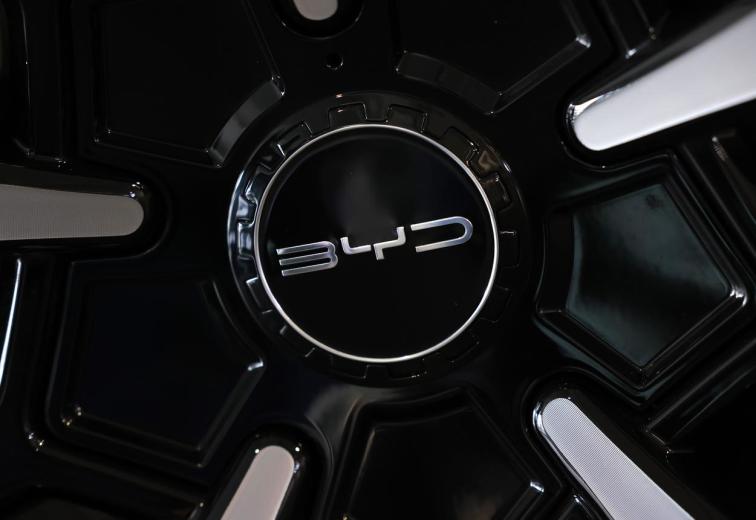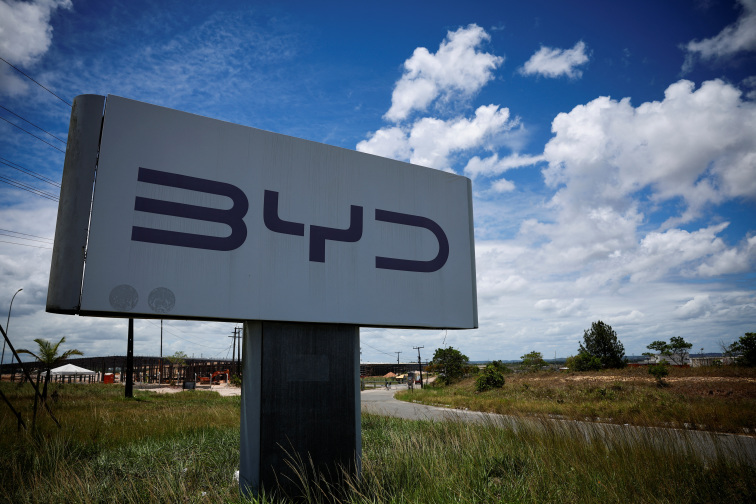On March 30, 2025, a major earthquake struck Myanmar. A 33-story building in Bangkok, Thailand, located 1,000 kilometers away, collapsed during the quake. (Video screenshot)
[People News] The 33-story building of Thailand’s Office of the Auditor General, constructed by China Railway No. 10 Engineering Group (a subsidiary of China’s state-owned enterprise), collapsed in seconds during a Myanmar earthquake. It was the only building in Bangkok to collapse during the quake, resulting in nearly a hundred casualties and missing persons. This incident has sparked international criticism over the “tofu-dreg projects” of the Chinese Communist Party’s (CCP) Belt and Road Initiative. Thai authorities confirmed that at least two types of substandard steel were used and launched an investigation into the Chinese contractor. However, when law enforcement arrived, they found the offices empty—the personnel had long since disappeared, and all related phone lines were unreachable. In response, Thailand announced a comprehensive investigation into all projects involving China Railway No. 10, including a thorough inspection of construction materials used in those projects.
The incident has triggered global suspicion and even calls to boycott Chinese construction companies. Some netizens commented bluntly: “Thankfully, the auditor general’s building wasn’t yet occupied—otherwise the casualties among Thai officials would be unimaginable. These shoddy CCP projects overseas have become hidden time bombs and tools for murdering foreigners in critical moments.”
Mana Nimitmongkol, chairman of Thailand's Anti-Corruption Organization, recently stated that they had inspected the project site multiple times during construction and had already observed delayed progress, labor shortages, and signs of potential corner-cutting. Thai Minister of Industry, Akanat Promphan, had repeatedly warned in recent months about the quality problems with Chinese-made industrial products, stating that these inferior products could have “catastrophic consequences” for Thailand.
During the first Trump administration, U.S. tariffs on Chinese products pushed Chinese enterprises to seek “tax havens” in Southeast Asia. As a result, Chinese capital flooded into Thailand. According to official Thai statistics, China is currently Thailand’s largest source of foreign investment. However, international media reports say that because Chinese investments have done little to boost the local economy, many locals and public officials have expressed discontent.
Somsak Tippayarat, a scrap metal recycler in central Thailand, stated that the root cause of poor-quality steel lies in government corruption and cost-cutting by Chinese firms: “They use low-grade steel to disrupt the market. They initially submit samples that meet the standards for certification, but then switch to inferior materials during mass production.”
Labor rights advocate Jirun Petra noted that although there are more and more Chinese factories in Thailand, very few local workers are actually hired.
Under public pressure, the Chinese Embassy issued a statement urging Chinese state-owned enterprises to cooperate with Thai investigations. However, Li Yuanhua, a historian based in Australia, remarked that such statements are essentially attempts to deflect blame. He noted that shoddy construction is rampant within China itself, and the CCP does not regulate those cases, so its embassies abroad have even less oversight over overseas Chinese firms.
In fact, the phenomenon of “tofu-dreg projects” under CCP rule being exported through the Belt and Road Initiative is not limited to Thailand’s auditor general building. On November 1, 2024, the roof of Novi Sad railway station in northern Serbia collapsed, killing at least 14 people. The station had just undergone a three-year reconstruction project completed in July 2024. Serbia’s Minister of Construction, Vesić, confirmed that the project was undertaken by China Railway International Co., Ltd. (CRIC), a subsidiary of China Railway Group, and China Communications Construction Company (CCCC).
On June 26, 2017, a bridge in Sigiri, Kenya, constructed by China Railway No. 10, collapsed, injuring at least 27 people. The Sigiri Bridge, located in Kenya’s western Budalang'i area and spanning the Nzoia River, cost about 80 million RMB.
On March 27, U.S. Secretary of State Marco Rubio visited Guyana and then Suriname, where he held a joint press conference with Suriname’s President Santokhi. When asked by reporters about the CCP’s influence in the Caribbean and Latin America, Rubio criticized the poor quality of Belt and Road projects, saying that Chinese companies have “done a terrible job” in those regions. Citing the Chinese-built roads in Guyana, he joked that they nearly gave him a concussion. He said the U.S. could offer an alternative.
Rubio stated, “After returning from Guyana, I had to drive on roads built by the Chinese. Those roads were worse than dirt roads, in terrible condition. We were nearly shaken into concussions... If such roads were built in the U.S., the builders would be sued and have to pay a massive settlement.” He went on to criticize the CCP’s approach to foreign infrastructure, saying, “These projects are never completed on time, always over budget, and they bring in their own workers instead of hiring locals.” He added, “Or they want you to borrow a huge sum of money and then use that debt to control you.”
In response to the growing overseas calls to 'boycott Chinese investments', the Chinese Communist Party (CCP) has reacted with intense criticism.
On April 3, during a regular press briefing at the Ministry of Foreign Affairs, a reporter inquired about an incident in Guyana where a road nearly caused Senator Rubio to suffer a 'concussion'. Spokesperson Guo Jiakun vehemently criticized Rubio, accusing him of 'speaking nonsense', 'slandering', and 'inciting discord'. He concluded by admonishing Rubio in a teacher-like manner, suggesting he should focus on doing something constructive for the regional countries.
Guo Jiakun asserted that the road in question was not constructed by a Chinese company. However, public records indicate that in 2018, the Guyanese government at the time joined the CCP's 'Belt and Road Initiative'. In recent years, Chinese companies have been actively involved in significant construction projects in Guyana, including the renovation of Cheddi Jagan International Airport and the expansion of the Demerara East Coast Road. According to CCP state media, in March 2023, China (CCP) Power Construction completed the Guyana Che–Man Road project, aiding the capital city of Georgetown in upgrading its main thoroughfare. In December 2023, the Guyana Ministry of Public Works confirmed that China (CCP) Road and Bridge had won the bid for the renovation of the Good Success-Timehri section of the airport road.
Experts suggest that the collapse of a building in Thailand during the Myanmar earthquake has revealed just the tip of the iceberg regarding the CCP's substandard overseas projects. The extent of the underlying issues will likely lead other countries to reevaluate their partnerships with the CCP and Chinese state-owned enterprises. Currently, the skepticism expressed overseas serves as a warning to nations along the 'Belt and Road', urging them to distance themselves from the CCP and the hidden risks associated with such investments to ensure peace.










News magazine bootstrap themes!
I like this themes, fast loading and look profesional
Thank you Carlos!
You're welcome!
Please support me with give positive rating!
Yes Sure!